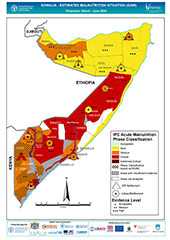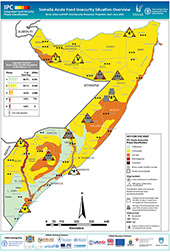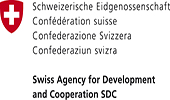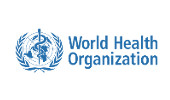Market Data Update February, 2013
Issued: March 19, 2013
Inflation: Since the beginning of the year, Consumer Price Index (CPI) declined slightly in the South, accelerated marginally in the Central and remained relatively stable in the North. Annual inflation reduced in South-Central but increased somewhat in the Northern zones. Compared to the base period (March 2007), the minimum cost of living is elevated both in Somali Shilling (SoSh) as well as Somaliland Shilling (SlSh) areas.
Exchange rate: The SoSh sustained upward trend on the US Dollar (USD) particularly in the southern markets while the SlSh remained relatively stable for the second month in a row this year. Compared to the same month a year ago, SlSh has depreciated against the USD, while the SoSh gained value. The annual appreciation of the SoSh is a reflection of increased trade flows from seaports, positive economic revitalization signals in Mogadishu, relative stability in most regions, limited supply of SoSh notes and continued dollar inflows through humanitarian interventions, on-going foreign and domestic capital investments. The weakened SlSh is due to increased supply and circulation of new higher denomination notes.
Local grain prices were largely stable in most markets but declined notably in the crop producing Bay and Lower Shabelle Regions, mainly on the backdrop of good Deyr 2012/13 seasonal harvest, enhanced trade flows, humanitarian food supply and reduced prices of imported food. Overall, cereal prices remained at low levels, well below those of the same period last year.
Prices of most imported commodities sustained declining trends in local currency terms in most markets. An exception was a slight increase in diesel prices in some markets in the North and Central in response to the recent ban on diesel imports from Yemen by the Puntland Government. Compared to the same period last year, imported commodity prices are significantly lower in SoSh markets but higher in SlSh regions. The decline in prices of imported food is a result of the appreciation of the SoSh, increased imports through improved port operational capacity, improved security situation and humanitarian assistance. The increase in import prices in Somaliland markets is attributable to the reduced value of the SlSh.
Livestock prices remained stable to declining in most markets when compared to the previous month. The decline in livestock prices was on account of increased sales to cover rising water costs especially in the North where most natural water sources have dried up during Jilaal (Jan-Mar) dry season. Reduction in export quality goat prices was principally due to seasonal thinning in demand. Livestock prices are significantly higher than a year ago in all monitored markets as a result of average body conditions, restocking and rising consumption needs in Mogadishu.
Labour wages sustained their levels or reduced slightly in many markets in line with seasonal reduction in agricultural labour opportunities. Casual wages are significantly higher compared to their levels a year ago in most markets.
Terms of Trade (ToT) between labour wage and cereals were mixed- remained unchanged in most markets, declined in Banadir and improved in Bay, Gedo and Shabelle. The purchasing power of the poor who predominantly rely on casual labour has improved over the past year on account of lower cereal prices and higher labour wages.
Juba Valley: Prices of imported food, cereals and livestock declined in February. The ToT (12Kg/daily wage rate) maintained the previous month’s level. Compared to a year ago, prices are significantly lower for imported food and local cereals, whereas they are considerably elevated for livestock. Annual comparisons of ToT between labor and cereals also indicate a significant improvement in purchasing power for casual labourers.
Sorghum Belt: Reduction in prices of imported food, sorghum and livestock were recorded in February. The ToT between labour and cereals accelerated, in Gedo and Bay, remained unchanged in Bakool and decreased in Hiraan. Year-on-year price comparisons indicate a significant decrease for imported commodities and local cereals and a remarkable increase for livestock. More specifically, the ToT nearly doubled in Hiraan over the past year, increased significantly in Bay, remained stable in Gedo and declined in Bakool.
Shabelle Valley: Monthly prices of imported food, maize and livestock declined. The ToT is up by one unit (14kg of maize for a day’s worth of labour). Prices of most imported commodities and cereals are significantly lower while prices of livestock are significantly higher compared to the levels in the reference period in 2012.
Central: Imported food and livestock prices decreased slightly but the cost of red sorghum went up in February 2013. Annual comparisons indicate significant decreases in the prices of all items except in livestock prices, which have increased significantly. ToT (rice/ local goat) sustained January 2013 levels but is higher when compared to a year ago (Feb 2012), currently standing at 56kg/local goat.
Northeast: Price of most monitored commodities remained generally stable in comparison with previous month. However, prices declined significantly from a year ago for imported commodities and red sorghum but rose slightly for livestock. ToT (rice/ local goat) was relatively stable (77kg/local goat) over the past month although it is significantly higher when compared to the February 2012 levels.
Northwest: Prices of imported food, cereals and livestock remained stable with the exception of local quality goat that reduced remarkably. Compared to February 2012, the prices have reduced for locally produced cereals but accelerated for imported commodities and livestock. The monthly ToT between local white sorghum and local quality goat declined to 92kg per head of goat. However, the ToT is significantly higher when compared to the same month last year.
Banadir: Prices of imported food and white maize decreased moderately while goat prices incresaed in February. With the exception of highly valued goats, prices of imported food and locally produced cereals were significantly below their levels a year ago. ToT cereal (maize) labour/wage was one unit down from the preceding month to close at 16 kgs/ daily labour rate.

















